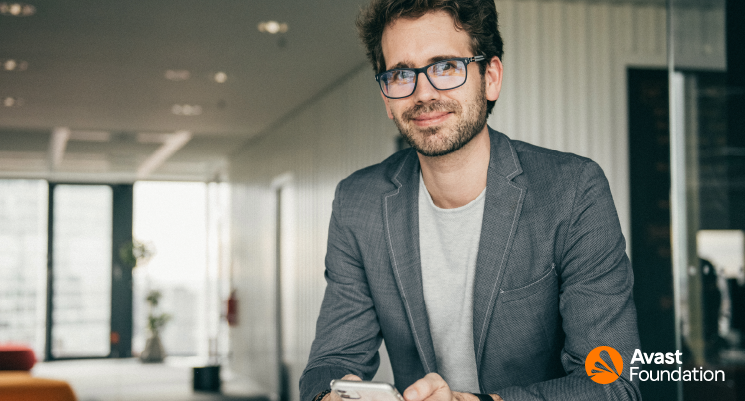The Avast Foundation this year sponsored the Climate and Environment prize in the Open Society Fund Praha’s annual Together We Open Data competition, which serves to highlight the importance and possibilities of open data for improving civil society. Avast Foundation Advisory Board Member and Avast Chief Technology Officer, Michal Pechoucek, delivered remarks at the award ceremony on November 23, and Miroslav Umlauf, Chief Data Officer at Avast and a long-time advocate for open data, sat on the expert jury which awarded the competition winners. In this article, Miroslav explains the concept of open data and describes how open data holds the potential to empower citizens and enable us to solve complex social issues, should we choose to embrace it.
Congratulations to Envidata, the winner of this year’s Together We Open Data Climate and Environment category, for the platform they’ve built to visualize publicly available climate data in the Czech Republic.
Making impact with open data
Data doesn’t have value on its own. To be valuable, it needs to be available for use. And still it is not always straightforward and requires the right mix of skills and technologies to turn it into something truly valuable. Using data means giving it context to transform it into information. As we turn information into choices we build knowledge and act. With the help of technology this process can be made faster and the value we can capture from data is enormous. This is valid for any data, whether it comes from the business, research or public sector. Open data is no exception.
So what makes data open? Open data refers to data that anyone can access and use, not just to create analytical insight, but for example to make a product or application based on it. Putting data together (integrating) is one of the most critical steps in capturing its value. Many things can get complicated and patience is an essential feature of data people.
There are several definitions of what makes data open, but in general, anyone can access it, use it and share it. There shouldn’t be any limitations with regards to what the data is used for, how it is used (e.g. it can be combined) and by whom. And it needs to be free to use (which doesn’t mean it must be always freely available: Preparing data for publishing is often non-trivial and the costs should be reasonably reflected in the fee). Open data should be machine readable. All this is important, but the real value is driven by what the data can be used for and how many citizens can benefit from it.
Why has open data recently been in the spotlight? Digitalization and digital transformation make it easier to capture data. We learned that data brings benefits to anyone who can use it. Open data is the means by which civil society can reap the benefits of data, and applications built on top of this data can empower citizens or civil servants. There are quality examples of how data is used by businesses and governments, within and beyond the EU. Open data has made some governments more transparent, opened innovation in public transport, provided insight into quality of life and livelihood in different regions, and even enabled early warning systems for disastrous events, among other benefits.
Undoubtedly, open data has the potential to power applications that solve real problems in society. Czech Republic is still quite far away from the world’s leaders when it comes to releasing open data. For over a half decade, the Open Society Fund Praha (OSF) has taken a moment at the end of each year to celebrate the best application built on top of open data in order to drive awareness and encourage data openness in the Czech Republic. Having been on the jury of the Together We Open Data competition for several years, I can say that selecting the award winner has been no easy task. Looking under the hood of new projects and doing technical assessment is far easier than considering the impact of applications on society. Through the evaluation process I learn a lot from the projects which apply to the competition, mostly about challenges that I don’t see in my business-only life. It’s both an honour and inspiration to be closer for a while to the charitable aims of OSF, which brings together people from companies, universities or local governments who form the open data community of enthusiasts and experts. In recent years I have seen the following improvements happening: more data being released and made accessible, and although there is still fragmentation and the use of open data in informing real world problems is limited, the desire to innovate with open data is stronger every year. In addition, public administration in some regions has become more accountable.
The contest has always created a positive impact. It doesn’t mean that the participating applications always become a product used by the masses. But each year, it shows there is a value in the data and it spurs inspiration. It is impressive to see how much time the participants had to invest, how much expertise they have and how they can transform the vision into a functional app.
This year 20 teams applied by submitting apps in 4 categories (City Data, Climate and Environment, Education, and Health) and you can look closer to the winning applications here.
There is still a lot to be improved in open data. It would be great if there were more participation from companies or organizations which have employees with experience to translate ideas into viable products. In the long run, it is a closer collaboration between public and private, academia and business, government and its administration in digital transformation which is essential to realizing the value we already know how to get from using data.
